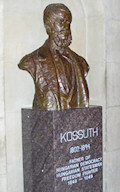 By Bryan Dawson - "The spirit of our age is Democracy. All for the people and all by the people. Nothing about the people, without the people. That is Democracy, and that is the ruling tendency of the spirit of our age." - Louis Kossuth, spoken before the Ohio State Legislature, February 16, 1852, more than a decade before Lincoln's Gettysburg Address. By Bryan Dawson - "The spirit of our age is Democracy. All for the people and all by the people. Nothing about the people, without the people. That is Democracy, and that is the ruling tendency of the spirit of our age." - Louis Kossuth, spoken before the Ohio State Legislature, February 16, 1852, more than a decade before Lincoln's Gettysburg Address.
Speaking to half the population of the United States at the time and witnessed by heroic welcomes across the country, Louis Kossuth's impact on the United States was nothing short of historic. Kossuth was the first foreign statesman since the Marquis de Lafayette to address a joint session of Congress.
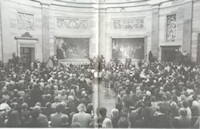 To celebrate and commemorate the friendship and shared values between the people of the United States and those of Hungarian descent, The American Hungarian Federation commissioned a bronze bust of Lajos Kossuth and offered it to U.S. Congress. House Concurrent Resolution 251 (Introduced by Congressman Tom Lantos,
cosponsored by Congressman William Broomfield and a Senate support motion
by Sen. Pell) called for placement of the statue in the US Capitol. It
was adopted on Feb 27, 1990 (House) and March 1 (Senate). To celebrate and commemorate the friendship and shared values between the people of the United States and those of Hungarian descent, The American Hungarian Federation commissioned a bronze bust of Lajos Kossuth and offered it to U.S. Congress. House Concurrent Resolution 251 (Introduced by Congressman Tom Lantos,
cosponsored by Congressman William Broomfield and a Senate support motion
by Sen. Pell) called for placement of the statue in the US Capitol. It
was adopted on Feb 27, 1990 (House) and March 1 (Senate).
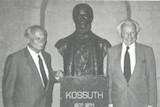 The dedication ceremony took place on March 15, 1990, Hungarian National Day, under the magnificent dome of the Capitol Rotunda. The bust is one of only two honoring non-Americans in the Capitol. The base reads, "Louis Kossuth, Father of Hungarian Democracy." The dedication ceremony took place on March 15, 1990, Hungarian National Day, under the magnificent dome of the Capitol Rotunda. The bust is one of only two honoring non-Americans in the Capitol. The base reads, "Louis Kossuth, Father of Hungarian Democracy."
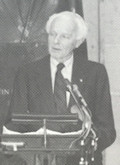 The welcoming
text was delivered by Honorable Tom Lantos (D-CA) who also wrote the forward to the commemorative book wheer he remarked, "Placing a bust of this Father of Hungarian Democracy in the United States Capitol is an appropriate recognition of Kossuth's association with the history of our nation more than a century ago. At the same time, it is also a timely and most fitting gesture marking the historic victory of freedom and democracy in Central and Eastern The welcoming
text was delivered by Honorable Tom Lantos (D-CA) who also wrote the forward to the commemorative book wheer he remarked, "Placing a bust of this Father of Hungarian Democracy in the United States Capitol is an appropriate recognition of Kossuth's association with the history of our nation more than a century ago. At the same time, it is also a timely and most fitting gesture marking the historic victory of freedom and democracy in Central and Eastern  Europe, which we have witnessed in recent months." The commemoative book is available for download on the top right. Senator Robert Dole addressed the audience and reflected on the fall of communist regimes and the dramatic changes in Central and Eastern Europe underway by quoting Louis Kossuth: "There are more things in heaven and earth than are dreamed of in our philosophy." Europe, which we have witnessed in recent months." The commemoative book is available for download on the top right. Senator Robert Dole addressed the audience and reflected on the fall of communist regimes and the dramatic changes in Central and Eastern Europe underway by quoting Louis Kossuth: "There are more things in heaven and earth than are dreamed of in our philosophy."
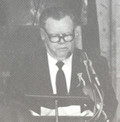 Rev. Bishop Tibor Domotor, President of the American Hungarian Federation, presented the Kossuth Bust to the People of the United States. He welcomed the audience and Rev. Bishop Tibor Domotor, President of the American Hungarian Federation, presented the Kossuth Bust to the People of the United States. He welcomed the audience and  emphasized the historic ties between the two countries and Hungary's repeated fight for freedom and democracy, remarking, "[Kossuth] was greatly influenced by the Constitution and the republican form ofgovernment in the United States of America." He added, "In the name of the American Hungarian Federation, I hand over this bust of Lajos Kossuth to the Congress of the United States in the memory of the 1848-49 freedom fighters, heroes, and martyrs. At the same emphasized the historic ties between the two countries and Hungary's repeated fight for freedom and democracy, remarking, "[Kossuth] was greatly influenced by the Constitution and the republican form ofgovernment in the United States of America." He added, "In the name of the American Hungarian Federation, I hand over this bust of Lajos Kossuth to the Congress of the United States in the memory of the 1848-49 freedom fighters, heroes, and martyrs. At the same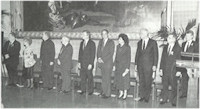 time, we wish to remember the 1956 freedom fighters, heroes, and martyrs who fought and died for the goals Lajos Kossuth set forth. We with to thank the American people for their committment to freedom and democracy." time, we wish to remember the 1956 freedom fighters, heroes, and martyrs who fought and died for the goals Lajos Kossuth set forth. We with to thank the American people for their committment to freedom and democracy."
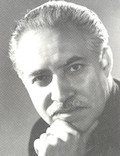 The sculpture was unveiled by the renowned sculptor and AHF Board member, Csaba
Kur of Youngstown, OH who passed away on Octrober 21, 2009 (Two days before the anniversary of the Hungarian Revolution of 1956). The "Father of the Rumanian Revolution,"
Rev. Tokes of Transylvania, the leader of the anti-Ceaucescu revolution in Rumania, also addressed the audience. The Rev. Imre Bertalan, AHF President Emeritus, delivered the closing Benediction. The sculpture was unveiled by the renowned sculptor and AHF Board member, Csaba
Kur of Youngstown, OH who passed away on Octrober 21, 2009 (Two days before the anniversary of the Hungarian Revolution of 1956). The "Father of the Rumanian Revolution,"
Rev. Tokes of Transylvania, the leader of the anti-Ceaucescu revolution in Rumania, also addressed the audience. The Rev. Imre Bertalan, AHF President Emeritus, delivered the closing Benediction.
After the Ceremonies there
was a reception given by HRFA,
the William
Penn Association, and the Congressional Human Rights Foundation in
the Statuary Hall of the US Capitol followed by the American Hungarian Federation dinner where we issued a declaration to commemorate the dedication. The declaration states:
"We, American Hungarians, believe that we shall forever see this great nation of the United States and the presently poor, much suffered nation of Hungarians, the nation of our former Fatherland, to stay in harmonious friendship and cooperation with each other and with all other freedom-loving, democratic nations of the earth.
And, that from this day on, the likeness of Louis Kossuth which was accepted as the gift of our American Hungarian Federation for the Statuary Hall of the United States Capitol will forever symbolize Louis Kossuth's great ideas as well as outr firm belief in them."
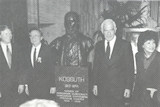 Congressman Don Ritter of Pennsylvania, himself of Hungarian heritage and son-in-law to Rep. Tom Lantos, was the keynote speaker at the AHF dinner. Congressman Don Ritter of Pennsylvania, himself of Hungarian heritage and son-in-law to Rep. Tom Lantos, was the keynote speaker at the AHF dinner.
Kossuth Lajos, was Regent-President of the Kingdom of Hungary and leader of the 1848 anti-Hapsburg, pro-Democracy revolution eventually crushed only by the combined royalist forces of Austria and Russia. Kossuth,freedom-fighter, visionary, and the "George Washington of Hungary" is the preeminent symbol of
Hungarian national independence and democratic values.
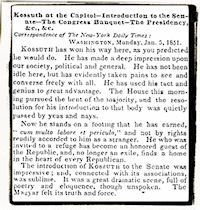 Kossuth envisioned a "Danubian Federation" in the Kingdom of Hungary in which all nationalities participated in a vibrant democratic system based on fundamental democratic principles such as equality and parliamentary representation. Thebloody conflict eventually led to the "great compromise" known as the "Austro-Hungarian Empire," in which Hungary gained some internal autonomy, but Kossuth would have no part of demanding full indepependence until his death. He came to the United States to seek support and was greeted with wild enthusiasm across the country. Kossuth envisioned a "Danubian Federation" in the Kingdom of Hungary in which all nationalities participated in a vibrant democratic system based on fundamental democratic principles such as equality and parliamentary representation. Thebloody conflict eventually led to the "great compromise" known as the "Austro-Hungarian Empire," in which Hungary gained some internal autonomy, but Kossuth would have no part of demanding full indepependence until his death. He came to the United States to seek support and was greeted with wild enthusiasm across the country.
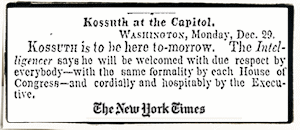 While his anti-slavery stance made some in Congress uncomfortable, Americans flocked to see and hear the man, as Ralph Waldo Emerson wrote, "whose extraordinary eloquence is seconded by the splendor and the solidity of his actions." While his anti-slavery stance made some in Congress uncomfortable, Americans flocked to see and hear the man, as Ralph Waldo Emerson wrote, "whose extraordinary eloquence is seconded by the splendor and the solidity of his actions." 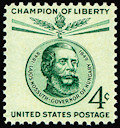 The U.S. Postal Service issued Louis Kossuth stamps in 1958 as part of the "Champion of Liberty" series designed by AHF's renowned artist Gabriella Koszorus Varsa a recipient of AHF's highest honor, the Michael Kovats Medal of Freedom, for her lifetime achievements. Read more about Kossuth on the right column. The U.S. Postal Service issued Louis Kossuth stamps in 1958 as part of the "Champion of Liberty" series designed by AHF's renowned artist Gabriella Koszorus Varsa a recipient of AHF's highest honor, the Michael Kovats Medal of Freedom, for her lifetime achievements. Read more about Kossuth on the right column.
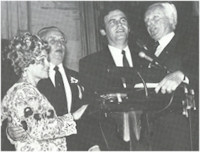 The Kossuth Bust has become a prime destination for annual commemorations of the 1848 War of Independence. On March 15th, 2006, President Bush Honored 1848 and "Hungary's Contributions to Democracy." President Bush remarked, “I believe the
example of Hungary proves that freedom is universal. I believe everybody
desires to live in freedom,” President Bush said. “It's
an example that tyranny can never stamp out the desire to be free.” The Kossuth Bust has become a prime destination for annual commemorations of the 1848 War of Independence. On March 15th, 2006, President Bush Honored 1848 and "Hungary's Contributions to Democracy." President Bush remarked, “I believe the
example of Hungary proves that freedom is universal. I believe everybody
desires to live in freedom,” President Bush said. “It's
an example that tyranny can never stamp out the desire to be free.”
 U.S.
Ambassador to Hungary George Walker, also speaking at the commemoration
in Washington, paid tribute to “the freedom fighters of 1848 and
1956 who fought for independence, for a more democratic political system
and for human rights.” He also noted that in 1989 “Hungarians
opened their gates to East German citizens fleeing their country in large
numbers and simultaneously, and at considerable risk, opened the doors
to Austria and freedom, thereby defying the Warsaw Pact.” U.S.
Ambassador to Hungary George Walker, also speaking at the commemoration
in Washington, paid tribute to “the freedom fighters of 1848 and
1956 who fought for independence, for a more democratic political system
and for human rights.” He also noted that in 1989 “Hungarians
opened their gates to East German citizens fleeing their country in large
numbers and simultaneously, and at considerable risk, opened the doors
to Austria and freedom, thereby defying the Warsaw Pact.”
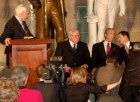 The
chair of the celebration was Hungarian-born U.S. Congressman Tom Lantos
of California, the ranking Democrat on the House International Relations
Committee. The
chair of the celebration was Hungarian-born U.S. Congressman Tom Lantos
of California, the ranking Democrat on the House International Relations
Committee. 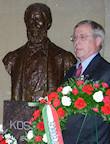 Bush praised Lantos as “a person who understands the
difference betweenfreedom and tyranny,” and he thanked Lantos and
his wife “for never letting anybody forget that freedom is precious
and necessary in our world.” AHF Co-President Jules (Gyula) Balogh is seen here at the 2006 commemoration. Bush praised Lantos as “a person who understands the
difference betweenfreedom and tyranny,” and he thanked Lantos and
his wife “for never letting anybody forget that freedom is precious
and necessary in our world.” AHF Co-President Jules (Gyula) Balogh is seen here at the 2006 commemoration.
[>> Go to More AHF History] [>>
Go to all AHF news] |
![Dedication by the United States Congress of a Bust of Lajos (Louis) Kossuth: Proceedings in the U.S. Capitol Rotunda - with a forward by Rep. Tom Lantos [Download 4.5Mb]](images/AHFHistory/kossuth_unveiling_program.jpg)
[< Back to All AHF History]
Dedication by the United States Congress of a Bust of Lajos (Louis) Kossuth: Proceedings in the U.S. Capitol Rotunda - with a forward by Rep.
Tom Lantos [Download 4.5Mb]
AHF 100 YEARS DISPLAY
at the 2007 AHF Congressional Reception
(click on image for a larger version)
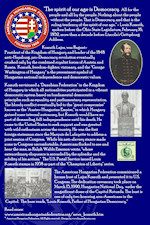
AHF and the Kossuth
Bust in the US Capitol
Read More AHF History
Related Articles:
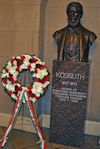 3/16/2010 - 20th Anniversary of the Dedication of the Kossuth Bust in the US Capitol... To celebrate and commemorate the friendship and shared values between the people of the United States and those of Hungarian descent, the American Hungarian Federation commissioned a bronze 3/16/2010 - 20th Anniversary of the Dedication of the Kossuth Bust in the US Capitol... To celebrate and commemorate the friendship and shared values between the people of the United States and those of Hungarian descent, the American Hungarian Federation commissioned a bronze 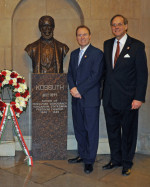 bust of Lajos Kossuth and offered it to U.S. Congress in 1990. AHF leaders and members of the community joined Congress, the Hungarian Embassy, and the Lantos Foundation in a commemoration of the 20th anniversary of its unveiling in the US Capitol. [read more] bust of Lajos Kossuth and offered it to U.S. Congress in 1990. AHF leaders and members of the community joined Congress, the Hungarian Embassy, and the Lantos Foundation in a commemoration of the 20th anniversary of its unveiling in the US Capitol. [read more]
Shortcuts:
Famous Quotes
"the house of Habsburg-Lorraine, perjured in the sight of
God and man, had forfeited the Hungarian throne."
Hungary, April 1849
"All for the people and all by the people. Nothing about
the people without the people. That is Democracy, and that is the ruling
tendency of the spirit of our age."
Spoken before the Ohio State Legislature,
February 16, 1852
More About Louis
Kossuth
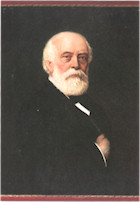 Kossuth
Lajos (b. 1802, d. 1894, pronounced co-shoot luh-yôsh) was Governor of Hungary during the 1848-1849 War of Liberation for independence and democracy which
was eventually defeated by the union of the royalist Austrian Habsburg
and Russian Czarist Armies (1848 - 1849). Kossuth envisioned a federation
in the Kingdom of Hungary in which all nationalties participated in a
vibrant democratic system based on fundamental democratic principles such
as equality and parliamentary representation. The bloody conflict eventually
led to a great compromise known as the "Austro-Hungarian Empire,"
in which Hungary gained some autonomy. although Kossuth would have no
part in it and demanded full indepependence until his death. Kossuth
Lajos (b. 1802, d. 1894, pronounced co-shoot luh-yôsh) was Governor of Hungary during the 1848-1849 War of Liberation for independence and democracy which
was eventually defeated by the union of the royalist Austrian Habsburg
and Russian Czarist Armies (1848 - 1849). Kossuth envisioned a federation
in the Kingdom of Hungary in which all nationalties participated in a
vibrant democratic system based on fundamental democratic principles such
as equality and parliamentary representation. The bloody conflict eventually
led to a great compromise known as the "Austro-Hungarian Empire,"
in which Hungary gained some autonomy. although Kossuth would have no
part in it and demanded full indepependence until his death.
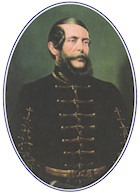 His "all for the people" speech from which the above excerpt is taken was given over a decade
before Lincoln's famed "for the people, by the people" speech
given at Gettysburg in 1863. Kossuth was the first foreign Statesman officially
invited to the US since the Marquis de Lafayette. His upcoming speech
in the Congress of the United States made the pre-civil war joint house
nervous due to his democratic views on equality of all men. Kossuth learned
English while in prison and exile and spoke to half the population of
the US who enthusiastically greeted and flocked to hear him. Despite Hungary's
epic struggle and Kossuth's brave and noble efforts, the US, the "Bastion
of Democracy" turned him away, empty handed. Hungary was alone again
in its fight for democracy in 1956, and didn't regain freedom until 1989. His "all for the people" speech from which the above excerpt is taken was given over a decade
before Lincoln's famed "for the people, by the people" speech
given at Gettysburg in 1863. Kossuth was the first foreign Statesman officially
invited to the US since the Marquis de Lafayette. His upcoming speech
in the Congress of the United States made the pre-civil war joint house
nervous due to his democratic views on equality of all men. Kossuth learned
English while in prison and exile and spoke to half the population of
the US who enthusiastically greeted and flocked to hear him. Despite Hungary's
epic struggle and Kossuth's brave and noble efforts, the US, the "Bastion
of Democracy" turned him away, empty handed. Hungary was alone again
in its fight for democracy in 1956, and didn't regain freedom until 1989.
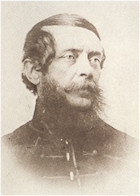 Today, there are many reminders of Kossuth's impact on America and the
world. In North America, there is a Kossuth County in the state of Iowa,
a town with his name in Indiana, Ohio and Mississippi,
a settlement with a Kossuth Post Office is in Pennsylvania. In addition,
there are Kossuth statues and plaques in New York, Cleveland, Akron, New
Orleans, Washington, and Ontario, Canada. The Hungarian
Reformed Federation's building on Dupont Circle, in Washington, DC
is called Kossuth House with a memorial plaque commemorating his speech
on democracy. See the picture gallery and memorials on Louis
Kossuth in North America. Today, there are many reminders of Kossuth's impact on America and the
world. In North America, there is a Kossuth County in the state of Iowa,
a town with his name in Indiana, Ohio and Mississippi,
a settlement with a Kossuth Post Office is in Pennsylvania. In addition,
there are Kossuth statues and plaques in New York, Cleveland, Akron, New
Orleans, Washington, and Ontario, Canada. The Hungarian
Reformed Federation's building on Dupont Circle, in Washington, DC
is called Kossuth House with a memorial plaque commemorating his speech
on democracy. See the picture gallery and memorials on Louis
Kossuth in North America.
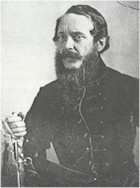 The renowned Ralph Waldo Emerson said in greeting Kossuth on his arrival
at Concord, MA, May 11, 1852: The renowned Ralph Waldo Emerson said in greeting Kossuth on his arrival
at Concord, MA, May 11, 1852:
"[we] have been hungry to see the man whose extraordinary eloquence
is seconded by the splendor and the solidity of his actions."
Kossuth was greeted with wild enthusiasm across the country. He was only
the second foreign leader (second to Lafayette) to address a joint session
of Congress.
Audio
Resources
 Hear
Louis Kossuth Speak! [Click Here] and follow the transcript below - This is the speech of Louis Kossuth which he gave for the dedication of the statue for the 13 Hungarian generals, who were executed at Arad, Hungary, on October 6, 1849 (Arad is in Rumania today after annexation due to the Treaty of Trianon in 1920 ).
Louis Kossuth was exiled after the fall of the Hungarian Liberation Fight of 1848 and made his permanent home in Torino (Turin), Italy. Hear
Louis Kossuth Speak! [Click Here] and follow the transcript below - This is the speech of Louis Kossuth which he gave for the dedication of the statue for the 13 Hungarian generals, who were executed at Arad, Hungary, on October 6, 1849 (Arad is in Rumania today after annexation due to the Treaty of Trianon in 1920 ).
Louis Kossuth was exiled after the fall of the Hungarian Liberation Fight of 1848 and made his permanent home in Torino (Turin), Italy. 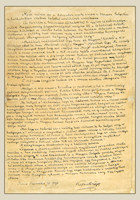 He could not attend the dedication of the monument at Arad, without risking arrest, so he recorded his speech in Turin, and sent it to Arad using the new technology of sound recording, called the phonograph. He could not attend the dedication of the monument at Arad, without risking arrest, so he recorded his speech in Turin, and sent it to Arad using the new technology of sound recording, called the phonograph.
The recording was made on September 20, 1890, when Kossuth was 88 years old. It is a sad fact that the monument Kossuth sent his speech for was torn down by the Rumanian government when they annexed Transylvania, along with Arad, in 1920, after World War I.
The original
recording on two wax cylinders for the Edison phonograph survives to this
day, although barely audible due to excess playback and unsuccessful early
restoration attempts. Lajos Kossuth is the earliest born person
in the world who has his voice preserved. Since the audio
is of such poor quality, here is it is transcribed in Hungarian and translated
to English (special thanks to Louis
Kossuth in North America)
Hungarian |
English |
"A világ bírája
a történelem fog e kérdésre felelni. Legyenek
a szentemlékû vértanúk megáldottak
poraikban, szellemeikben a hon szabadság Istenének
legjobb áldásaival az örökkévalóságon
keresztül; engem ki nem borulhatok le a Magyar Golgota porába,
engem október 6-a térdeimre borulva fog hontalanságom
remete lakában látni a mint az engem kitagadott Haza
felé nyújtva agg karjaimat a hála hû
érzelmeivel áldom a vértanúk szent emlékét
hûségükért a Haza iránt, 's a magasztos
példáért, melyet az utódoknak adtanak;
's buzgó imával kérem a magyarok Istenét,
hogy tegye diadalmassá a velõkig ható szózatot,
mely Hungária ajkairól a Magyar Nemzethez zeng. Úgy
legyen Ámen!
Turin
September 20 1890
Kossuth Lajos |
"The judge of the universe,
history, will decide over this question. Should the saintly remembered
martyrs be hallowed in their ashes, in their spirit with the highest
blessings of the Lord of Liberty and through eternity; I can not
pay my sympathies to the ashes of the Hungarian Golgotha, but October
6 will find me on my knees in this reclusive home of exile, as I
open my arms to my disowning homeland. With gratitude's faithful
sentiments, I bless the martyrs' sacred memory for their faith in
their homeland and for the sublime example they left to their heirs:
with ardent prayer I beg the God of Hungarians to make their appeal
which echoes from the lips of Hungaria to the Hungarian Nation.
So be it, Amen!
Turin
September 20 1890
Louis Kossuth |
|
Click to hear the recording: |
"Kossuth Lajos azt üzente,
elfogyott a regimentje.
Ha még egyszer azt üzeni,
mindnyájunknak el kell menni,
Éljen a magyar szabadság,
Éljen a haza ! |
Esik esõ karikára,
Kossuth Lajos kalapjára.
Valahány csepp esik rája,
Annyi áldás szálljon rája,
Éljen a magyar szabadság,
Éljen a haza!" |
Links
- AHF commemorating 1848:
2009, 2007, 2006
- President Bush Honors 1848 and Hungary's Contributions to Democracy
- Kossuth in America [visit]
- Select Speeches of Kossuth, Condensed and Abridged, with Kossuth's
Express Sanction [visit]
- Louis Kossuth, Mason And Apostle Of World Democracy [visit]
- Count Apponyi's Oration on the Death of Louis Kossuth [visit]
- Wikipedia - [visit]
and add your thoughts!
- Louis Kossuth in North America [visit]
- Kossuth County, Iowa [visit]
- Kossuth County, Iowa statue dedication
[visit]
- Dedication of statue to replace one destroyed by Rumanian occupation
forces in 1921: Gyergyócsomafalva, Transylvania [visit]
 Sign
up for the AHF mailing list. Sign
up for the AHF mailing list.
Your information is not shared!
Join online!

|



